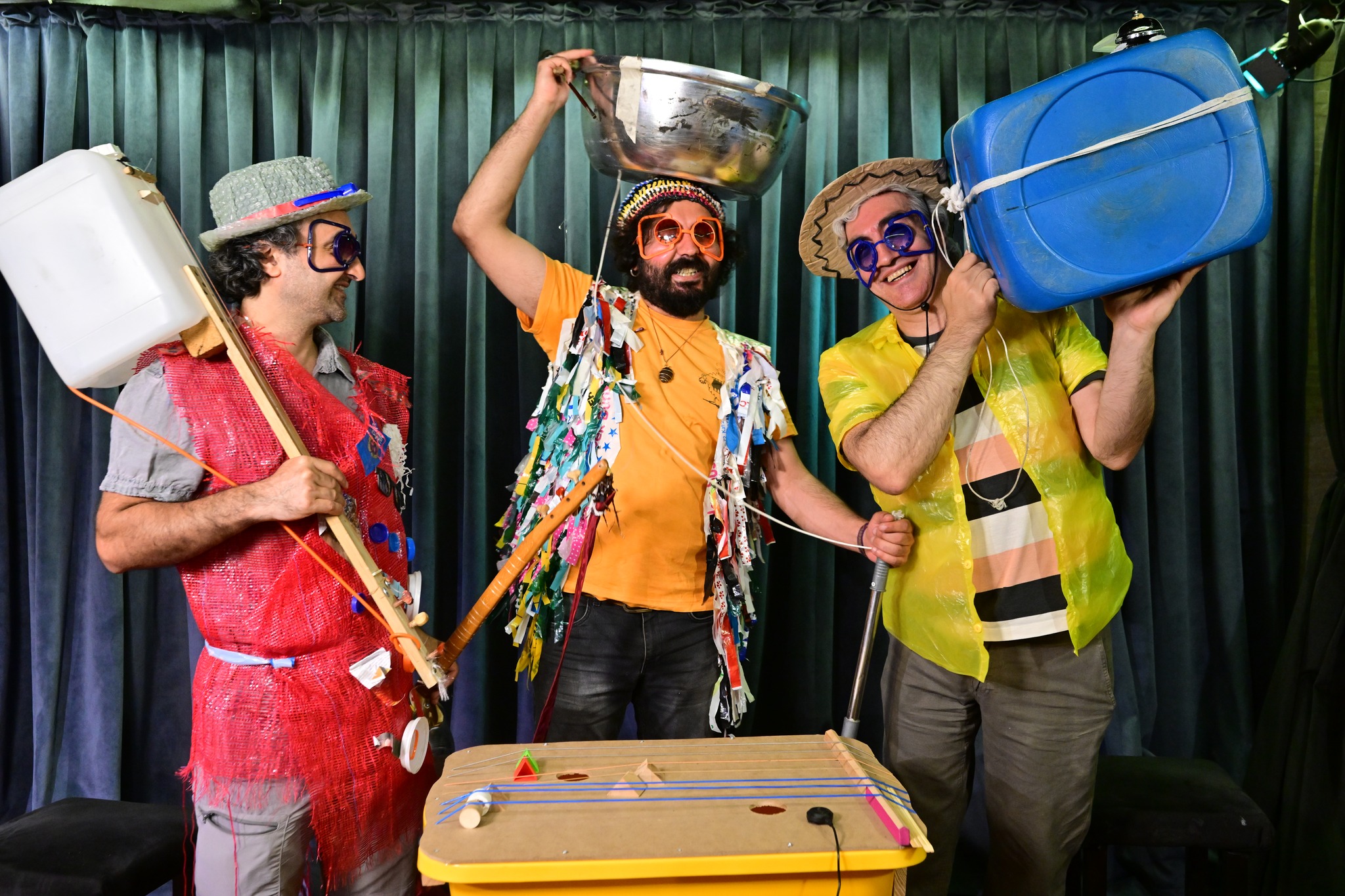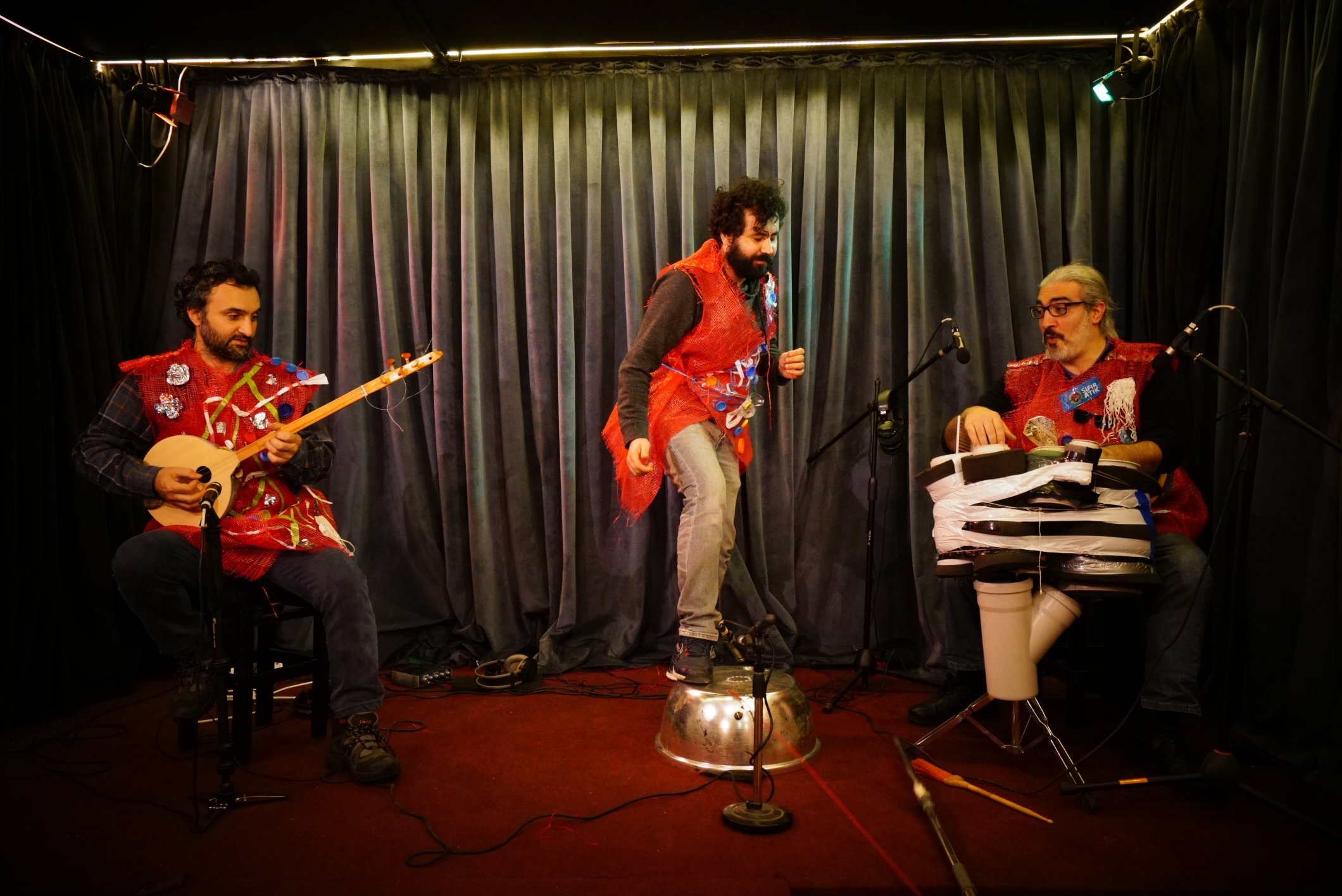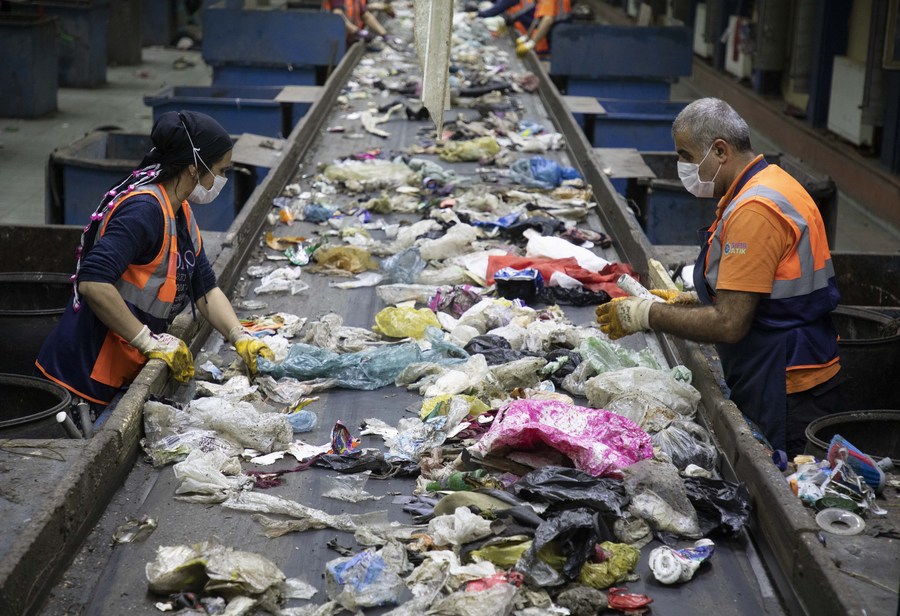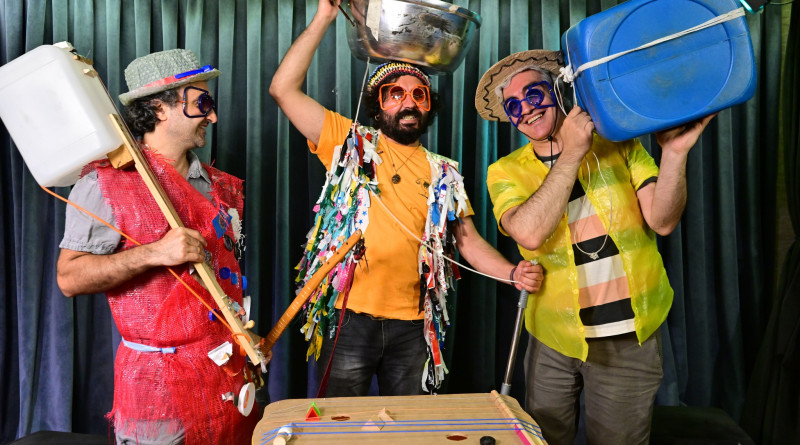Fungistanbul is playing in the opening of the Mahalla Festival

Roni Aran, Serhat Ayebe and Herman Artuç, members of Fungistanbul
FUNGISTANBUL is a trio that plays with instruments made from waste materials. The project was born in 2014 and they started working with recycled instruments in 2019. Roni Aran, Serhat Ayebe and Herman Artuç wanted to create awareness about the dangers of climate change, and nowadays they’re inspiring people with their music to recover the natural order of life. Their last album, called Trash Oriental, was released in 2022 and they received very good feedback from people who are sensitive to ecology and the environment. Fungistanbul comes from the word fungi, which in Latin means mushroom, as these living things are really important to decompose dead plants and animal residues, allowing nutrients to return to the ecosystem.
Fungistanbul got in touch with Diyalog when Thomas Büsch and Sabine Küper made a documentary video about them. After that, they send them some information about the group and Diyalog proposed them to meet and do something together. They called them for this year’s edition of the Mahalla Festival, in which they will be participating the 1st of September in the opening day of the festival.
INTERVIEW with Herman Artuç (Fungistanbul)
By Maëla Sanmartín

Maëla Sanmartín, Diyalog Derneği Herman Artuç, member of Fungistanbul
How did you get in touch with Diyalog?
Thomas and Sabine once made a documentary about Fungistanbul, and that’s how we met him. After that, we sent them some information about the group. That’s how they proposed that we meet and do something together, and they called us for this edition of the Mahalla Festival.
Are there other groups like yours in Türkiye?
Not in Türkiye, I’ve never heard of it. That’s why our project is interesting here, because some people are seeing it for the first time. People don’t believe that with these instruments from waste materials we could create an album called Trash Oriental. When they watch our performance, they are shocked, because it sounds like a professional music band. Our costumes are also designed with waste materials. This creates an interest between people, and it’s helping us to explain upcycling. The instruments designed are giving us power to explain the problems of nature, waste, and pollution. However, the fact is that there are few groups in the world that are making music from nature, with recycled instruments.
Are you all professional musicians in the group?
One of us, Roni, studied in the Conservatory. But Serhat and I learnt from our masters. I’m a latin jazz musician, and I play percussion. Serhat is a bass player, he plays double bass and electric bass. Roni plays many string instruments and designs many of them with his luthier friends. He’s very talented at making improvisations. We mostly work with improvisations in our music, but we’re also covering some traditional songs.
Do you improvise while recording your albums?
While recording, we play at the same time because we want the nature of sounds in our albums. We don’t want to copy and paste music.
Do the instruments usually go out of tune?
Yes, we are always tuning the instruments. We mainly tune the string instruments that Roni plays. With the pot bass, Serhat is trying to play near sounds, near tones: If it’s D, he’s using more or less 6 or 7 notes in the scale. But he can also play with rhythmic positions.
Our mind is working everywhere: could this material be an instrument?

Fungistanbul playing Trash Oriental 4
How is the process of choosing the materials to build an instrument?
Sometimes we find very interesting objects and sounds, and we want to use them for changing an instrument. Other times we’re deciding to arrange an instrument and we’re first deciding the material to build it. We try to find it on the street or different places, or we tell some friends to find them. Unfortunately, there is a lot of trash in Istanbul, it’s easy to find waste materials. But we continue with our work. Our mind is working everywhere: could this material be an instrument?
What about the workshops you do with children?
Sometimes the children bring their waste materials from their home -like bottles, some plastic- and we’re doing instruments together in workshops. They are so talented. We’re not saying “do this, do that”, we’re just playing with our instruments, explaining our project and showing them videos about what we do. We’re sometimes helping them on how to bring some parts together, but we’re not telling them what to do. They know about it. For us it’s important to see how they do, how they think. In Türkiye, there are many teachers with students doing instruments, and children send us pictures. It’s very good that we are inspiring them.
We must learn how to live with nature and not wait for the future
Are children aware of climate change in Türkiye? How is the situation in your country?
In schools, there are many teachers making workshops and classes about climate change and nature, using waste materials and upcycling them. In the last three or four years, there have been more protests happening in Istanbul, especially with young people. There are also artists making exhibitions about this topic. We have to find solutions. We must learn how to live with nature and not wait for the future. Sustainability is very important, because we are all producers or consumers. When you’re buying or when you’re producing something, we should think about the future and learn how to live a nature-friendly life. In this sense, like biodiversity, cultural diversity is also very important. If we say that biodiversity is important but cultural diversity is not, it’s comic.
Was it risky for your musical career to start the Fungistanbul project?
At first, when we started doing waste instruments, it was very risky, because we had a professional musical career. There’s a very thin line when doing experimental music, because you can make very bad music or a very interesting one. Although it was a risk for us to start this project, we’re very happy that everybody can listen to our music and enjoy it. For us, a music project is not just something for earning money. This is our life, and we feel the problems of humanity and nature.
This is not only our problem, this is a humanity problem

Workers sort the waste at a recycling plant in Istanbul, Türkiye, on May 25, 2021. (Photo by Osman Orsal/Xinhua)
Have you seen an evolution since you started your Fungistanbul project?
Yes, it’s very interesting. I’m giving drum lessons in a school in Istanbul, and one of the cleaning workers there told me: hey master, I’m using my can for cleaning and you’re making music with it! (Herman laughs). Or in the street where I live, many people have seen our project in the media and they honoured us. People tell us very good things. We’re also trying to make more exhibitions and concerts for people who still don’t know our project. We want to share our music, because this is not only our problem, this is a humanity problem.
What would you say to someone that asks you: Why do you waste your time playing instruments with wasted materials?
(Herman laughs). Some people are asking us similar things to what you said. When we were children, we were aware of many things, but years passed and we’re becoming very unaware of things. We’re humans, and our nature is being aware of everything in life. As years pass, some thoughts and sentiments are coming back, and we start to remember that this situation is a common issue. If you understand that: listen to us, listen to our music. You will feel what we’re doing.

